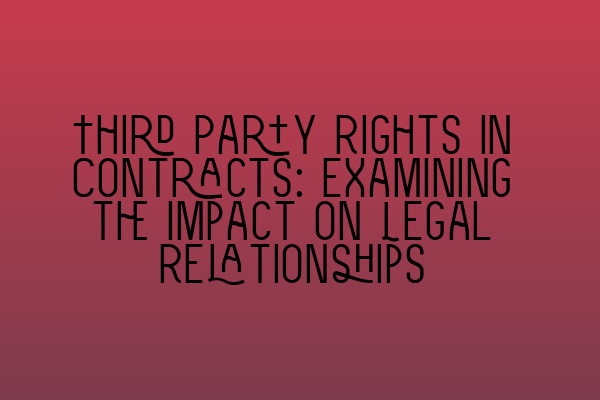Third Party Rights in Contracts: Examining the Impact on Legal Relationships
Contracts are the lifeblood of commercial transactions. They establish the rights, obligations, and responsibilities of the parties involved. However, what happens when a third party, who is not directly involved in the contract, seeks to enforce a provision or claim a benefit under the agreement? This is where the concept of third-party rights in contracts becomes relevant and can have a significant impact on legal relationships.
Before diving into the intricacies of third-party rights, it is essential to understand the basic framework of contract law. A contract typically involves two parties: the promisor, who makes a promise, and the promisee, who receives that promise. The general rule is that only these parties have the legal right to enforce the contract terms.
However, there are certain circumstances where a third party may have rights in a contract. This can occur through the inclusion of a specific provision, known as a ‘third-party beneficiary’ clause. Such a clause identifies an individual or entity who is not a party to the contract but has a direct interest in its performance or outcome. By including this clause, the parties intend to confer certain rights or benefits to the third party.
For example, imagine a construction project where Party A contracts with Party B to build a house. Party A may include a third-party beneficiary clause in the contract, stipulating that Party C, the future owner of the house, can enforce certain provisions related to quality standards or completion deadlines. In this scenario, Party C would have a direct right to sue Party B for any breach of those provisions.
The establishment of third-party rights can have several implications on legal relationships. Firstly, it expands the scope of who can participate in a contractual arrangement. By allowing third parties to have specific enforceable rights, the law recognizes their legitimate interests and actively involves them in the process. This can promote transparency and fairness in business dealings.
Secondly, the presence of third-party rights can introduce complexity and potential disputes. Parties must carefully consider their intentions and objectives when including a third-party beneficiary clause. They should ensure that the language used is unambiguous and reflects their true intentions. Failing to do so can create confusion or disagreements down the line, resulting in legal challenges and pitfalls.
Navigating Legal Challenges and Pitfalls in Your Practice
Furthermore, third-party rights can have an impact on the contractual rights and obligations of the original parties. For instance, if a contract allows a third party to claim certain benefits, the promisee’s ability to modify or terminate the contract may be limited. This is because any alteration or termination would affect the third party’s rights, potentially leading to a breach of contract claim.
It is crucial for solicitors to understand the intricacies of third-party rights in contracts, as they play a significant role in negotiating and drafting agreements. By effectively advising clients on the implications of including or excluding third-party beneficiaries, solicitors can help their clients make informed decisions and avoid future disputes.
The impact of third-party rights goes beyond contractual relationships. It can extend to various industries and sectors. For example, in the insurance industry, policyholders may include specific provisions allowing third parties, such as mortgage lenders or loss payees, to receive compensation in case of a covered loss. This ensures that the interests of all relevant parties are protected.
By recognizing third-party rights in contracts, the legal system fosters accountability and ensures that all parties with a legitimate interest are given proper protection. However, solicitors must navigate these complexities carefully to avoid unnecessary risks and legal challenges.
Barrister vs. Solicitor: A Comprehensive Comparison
When dealing with third-party rights, solicitors should consider the following key points:
- Identify the intended beneficiaries: Clearly define the third parties who are intended to benefit from the contract. If necessary, it may be beneficial to name specific individuals or entities rather than relying on generic terms.
- Specify the rights and obligations: Clearly outline the specific rights and obligations that the third party will have under the contract. This will ensure that everyone involved understands the scope of their responsibilities.
- Ensure clarity and specificity: Use clear and unambiguous language to avoid any confusion or misinterpretation. Ambiguity can lead to disputes and additional legal costs.
- Consider the impact on the parties: Analyze how the inclusion of third-party rights may affect the original parties. This includes considering any limitations on modifying or terminating the contract.
- Review local laws and regulations: Understand the legal framework in the jurisdiction where the contract will be enforced. Different countries may have varying rules and requirements regarding third-party rights in contracts.
Understanding the SRA Competence Statement: A Guide for Solicitors
In conclusion, third-party rights in contracts can significantly impact legal relationships. By allowing third parties to enforce certain provisions and claim specific benefits, the legal system ensures fairness and accountability. However, solicitors must navigate the complexities of third-party rights carefully to avoid potential pitfalls and disputes.
For more information on contract law and related topics, explore these articles:
